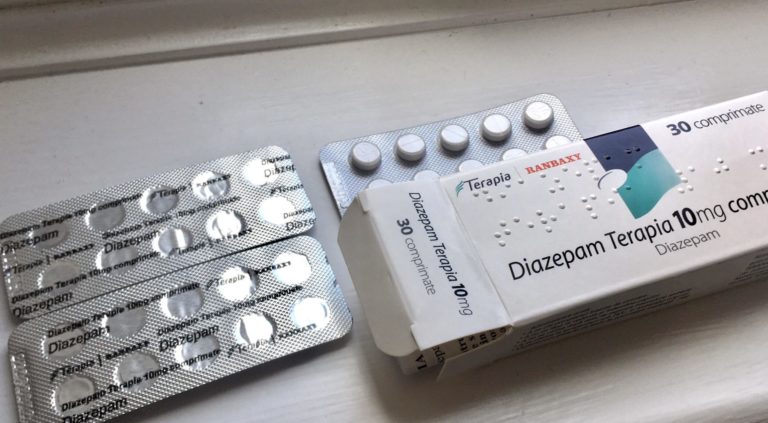Diazepam (Valium) is a drug that treats anxiety disorders and panic attacks. It can be addictive, so you should not take it without a doctor’s supervision. This medication belongs to the benzodiazepine class of drugs and has many side effects that are described below in this article.
Contents
- 1 What is Diazepam (Valium)?
- 1.1 How does it work?
- 1.2 Dosage Of Diazepam (Valium)
- 1.3 Directions Of Use
- 1.4 What are the side effects of Diazepam (Valium)?
- 1.5 When Should I expect To See Improvement In My Symptoms?
- 1.6 Precautions To Take
- 1.7 What are the interactions?
- 1.8 What are some other names for Diazepam (Valium)?
- 1.9 What are some alternatives to Diazepam (Valium)?
- 1.10 Withdrawal Of Diazepam (Valium)
- 1.11 Is Diazepam (Valium) Addictive?
- 2 Conclusion
What is Diazepam (Valium)?

Valium (diazepam) is a drug that treats anxiety and panic attacks. It falls within the benzodiazepine class of drugs, which are a type of psychoactive drug. Diazepam works by slowing down brain activity, which can help to relieve symptoms associated with anxiety disorders and panic attacks. This drug is available in both tablet and liquid form and is typically taken two to four times a day.
How does it work?
Diazepam affects the neurotransmitter gamma-aminobutyric acid (GABA), which is an amino acid that helps to calm down nerve activity. When GABA levels are higher, this can help to reduce anxiety and other stress symptoms.
Dosage Of Diazepam (Valium)
The typical dose of diazepam is 0.25 mg to 20 mg taken every four hours as needed for anxiety. Some people with a history of drug abuse should not take this medication because it can be hard to get rid of and lead to addiction. They need a doctor’s supervision.
- Dosage For Infants And Children: Infants and children may be given a lower dose of diazepam, depending on their weight. The dose is usually 0.05 mg to 0.15 mg per kilogram of body weight every four hours as needed for anxiety.
- Dosage for adults: Adults are usually given a dose of 0.25 mg to 20 mg every four hours as needed for anxiety or seizures.
Directions Of Use
Diazepam (Valium) may be taken with or without food and should be swallowed whole. It does not need to be broken, chewed, or crushed before use. This medication should be taken at the same time each day to keep blood levels consistent.
What are the side effects of Diazepam (Valium)?
Diazepam can cause a wide range of side effects, some of which can be serious. The most common side effects include:

- Drowsiness
- Fatigue
- Dizziness
- Lightheadedness
- Poor coordination
- Slurred speech
- Confusion and forgetfulness
This drug may cause withdrawal symptoms when you stop it after a long time. You should talk to your doctor before doing that.
When Should I expect To See Improvement In My Symptoms?
Diazepam can work quickly or take a long time. Some people feel better just a few days after taking it. Others need up to four weeks before feeling any difference. However, it is important to continue taking the medication as prescribed even if there is no immediate change in symptoms.
Precautions To Take

Diazepam should not be taken without a doctor’s supervision, especially if you have a history of drug abuse. This medication can be habit-forming and lead to addiction, so it is important to follow the dosage instructions closely. Do not stop taking this medication abruptly without consulting a doctor first. Diazepam can also cause drowsiness, so it is important to avoid engaging in hazardous activities while taking this medication.
What are the interactions?
Diazepam can interact with several drugs, including:
- Antidepressants such as fluoxetine (Prozac) and paroxetine (Brisdelle), which may increase its sedative effects.
- Benzodiazepines such as alprazolam (Xanax) and lorazepam (Ativan), which can increase the risk of overdose.
- Digoxin (Lanoxin), a medication used to treat heart failure, which may increase the level of diazepam in your blood.
- Warfarin (Coumadin), a medication used to prevent blood clots, which may increase the risk of bleeding.
Do not take diazepam without first talking to your doctor if you are taking any of these medications.
What are some other names for Diazepam (Valium)?
Diazepam is also available under the following brand names:
- Diastat
- Valium
- Dilaudid, which is a tablet form of diazepam that can be used in children older than six years. It was previously called Diazepam.
What are some alternatives to Diazepam (Valium)?

- Alprazolam (Xanax), the generic name for a drug that treats anxiety and panic disorders.
- Lorazepam (Ativan), the generic name for a drug that treats anxiety, seizures, and insomnia.
- Clonazepam (Klonopin), the generic name for a drug that treats seizure disorders and panic attacks.
- Gabapentin (Neurontin), the generic name for a drug that treats seizures and pain.
- Pregabalin (Lyrica), the generic name for a drug that treats seizures, fibromyalgia, and nerve pain.
If you are looking for an alternative to diazepam, talk to your doctor. The doctor will know what to do. They can give you medicine that works and doesn’t hurt you. The medicine might make the diazepam stop working for you after a little while.
Withdrawal Of Diazepam (Valium)
If you have been taking diazepam for an extended period, withdrawing from the medication can be difficult. The most common symptoms of withdrawal include:

- Anxiety
- Depression
- Tremors
- Sweating
- Nausea and vomiting
- Headache
- Muscle pain and stiffness
- Insomnia
It is important to note that these symptoms can be severe and require medical attention. If you experience any of these symptoms, contact your doctor for advice on how to manage them effectively.
If the symptoms are particularly bothersome, your doctor may recommend slowly tapering off diazepam over some time before discontinuing it completely. This will help reduce withdrawal symptoms.
Is Diazepam (Valium) Addictive?
Diazepam is a Schedule IV controlling substance, meaning that it has the potential for abuse and addiction. While not everyone who takes this medication will get addiction, it is important to be aware of the risks with taking diazepam.
If you are concerned about your ability to control your use of diazepam, talk to your doctor about your concerns. They can help you get the support and care that you need to manage this medication responsibly.
Conclusion
It is important to know the side effects of Diazepam before you start it. You will be able to ask your doctor questions and make sure you are safe. It can take six weeks for your body to adjust after starting this medication. If it feels bad, don’t give up too soon! Be sure not to stop using Valium suddenly without consulting a doctor first since withdrawal symptoms could occur. Doctors can help you decide what dose is best for you. They will consider your health condition and medical history.
If you are looking for affordable Online Counseling MantraCare can help: Book a trial therapy session


